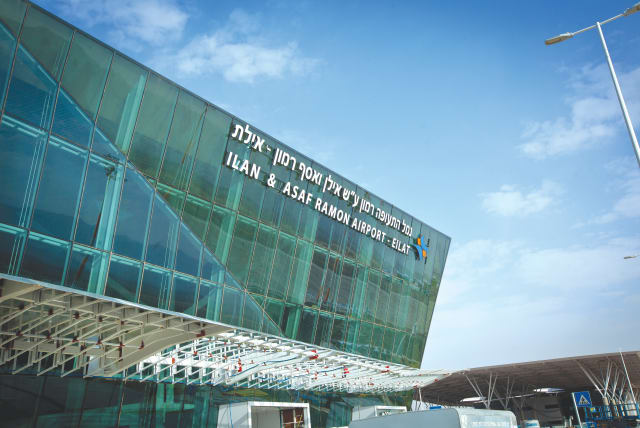Question marks hover over proposed Gaza-Turkey flights from Israeli airport

The plan allowing residents of the Gaza Strip to fly to Turkey from an Israeli airport is raising concerns about its practicality, cost-effectiveness, and potential risk for arrests.
Israel may soon permit residents of the Gaza Strip to fly to Turkey from the Ramon Airport in southern Israel, according to recent reports. A Palestinian tour operator has already begun advertising the flights, although the proposal has met with skepticism from Gazan authorities and commentators.
Israel's Channel 12 reported that the first flights could take place as soon as this month, although the plan is still subject to approval by Israeli security and political officials.
The Ramon Airport, deep in southern Israel, is about 110 miles southeast of the southern Gaza Strip border.
In Gaza, the Bikeen Travel company posted on its Arabic-language Facebook page that it would soon start offering regular Wednesday flights from Ramon Airport to the popular vacation destination of Antalya in Turkey. Bikeen Travel said the arrangement would be open to Gazans aged 35 and over, or to parents under 35 accompanied by their children.
Officials in the Gaza Strip said they knew nothing of the plan. Anis Arafat, director of public relations and information for the Ministry of Transport and Communications, said the reports were “incorrect,” and that “there is no official information” about the proposal.
Skepticism over the plan
Two million Palestinians live in the Gaza Strip, a 140-square-mile region bordering Israel and Egypt that has been controlled since 2007 by the extremist Islamist Hamas organization. Few Palestinians living in the Gaza Strip have permits to enter Israel, which regards the area as hostile territory.
Gazans wishing to travel to Turkey via Ramon Airport would need to obtain a permit from Israel and be shuttled from the Erez border crossing in the northern Gaza Strip to the airport, a road trip of several hours.
Gazans currently wishing to travel internationally must do so either by crossing into Egypt from the southern Rafah crossing, or by going to Jordan, leaving through the Erez crossing and traveling across Israel into the West Bank and from there into Jordan. Both journeys are long and cumbersome, made more difficult because Israel tightly restricts the number of permits issued to Gazans.
Last year, Israel floated a similar plan involving travel for Palestinians through Ramon Airport, but Jordan and the Palestinian Authority both opposed this, with the PA viewing the use of an Israeli airport as an attack on Palestinian sovereignty and Palestinian-Jordanian relations.
The plan provoked Palestinian skepticism. Talal Abu Zarifa, a member of the political bureau of the Democratic Front for the Liberation of Palestine, told The Media Line, “This plan aims to perpetuate and deepen the Israeli occupation.”
Abu Zarifa said that Israel destroyed the Gaza airport in 2001, forcing Palestinians living in the Gaza Strip “to go through unjust and harsh procedures that restrict their freedom of movement.”
The PA should take “a decisive stance blocking the path of these suspicious Israeli plans,” he said.
Gaza-based political analyst Mohammed Hijazi told The Media Line that the plan had two goals, one being to invigorate Ramon Airport economically, as it had failed to attract many Israeli passengers.
Israel’s second goal was to “isolate Gaza from the Palestinian cause” through the introduction of “fake facilitations,” Hijazi said. Other measures of this sort included Qatari financial support to Gaza and an increase in the number of Gazans permitted to work in Israel.
Hijazi said the plan violates Palestinian sovereignty because Israel continues to block the creation of a Palestinian airport or seaport in Gaza and maintains strict limits on the number of people allowed to leave.
“Instead, they give us these alternatives that serve their agenda,” Hijazi said.
He said many solutions had been proposed to mitigate Palestinian suffering in Gaza, but Israel had turned them all down and wanted the enclave to remain besieged and subject to full Israeli control.
Hijazi said the plan was also impractical, and that Israel would continue to create “many complications” and impose “strict conditions that are difficult to overcome,” with few Gazans able to benefit from it. He said the arrangement would “not be a good deal in terms of costs.”
Moreover, Palestinians will fear that the plan is a trap that will lead to “arbitrary arrest,” he said.
Jerusalem Post Store
`; document.getElementById("linkPremium").innerHTML = cont; var divWithLink = document.getElementById("premium-link"); if (divWithLink !== null && divWithLink !== 'undefined') { divWithLink.style.border = "solid 1px #cb0f3e"; divWithLink.style.textAlign = "center"; divWithLink.style.marginBottom = "15px"; divWithLink.style.marginTop = "15px"; divWithLink.style.width = "100%"; divWithLink.style.backgroundColor = "#122952"; divWithLink.style.color = "#ffffff"; divWithLink.style.lineHeight = "1.5"; } } (function (v, i) { });

